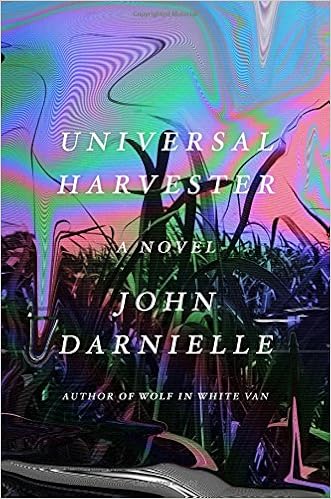
Universal Harvester by John Darnielle, author of Wolf in White Van, which was a NYT bestseller and National Book Award Nominee, could be classified as a horror novel (which I never read!), but turns into something quite different by the time it’s over.
Set in a small Iowa town in the late 1990's, when video stores were still ubiquitous, it tells the strange story of people reporting cut-away images showing up on the VHS tapes they check out at the local Video Hut. The images interrupt the regular movie and seem dark and disturbing. Jeremy, the young man working the counter of the video rental store, comes across as an aimless, disinterested character, but as the novel progresses, we see that he and his father are quietly still coming to terms with the recent fatal car accident of the matriarch of the family. The store owner, Sarah Jane, becomes obsessed with the strange videos and then seems to disappear on the farm where she recognizes the scenes have taken place.
The overall tone of this novel is disquieting and eerie. It is written in three parts, and all three deal with what ultimately happened on that farm in Nevada, Iowa. The novel has an extremely strong sense of place, with beautifully descriptive passages of the Iowa landscape, which becomes a character in itself.
This book was favorably reviewed in the NYT Book Review, but the Amazon reviews aren’t great. I think that it’s possible people reading it had expectations that weren’t met, as the big reveal of the mysterious images on the videos is something unexpected, yet still disturbing. I really enjoyed it for the story it told, the excellent writing and inner lives explored by some of the characters. For me, a story well told, with interesting characters and a unique perspective is worth reading, and this short novel met those requirements for me.

Melanie Wallace’s The Girl in the Garden is also a short novel, but tells a complete, fully developed story. I love Ms. Wallace’s writing, but it takes a little getting used to. The sentences are long and descriptive, and I found myself getting lost in them. The dialogue is not set out in quotations, which is a device I’ve noticed that authors are using more often. It was so well done in this book that I didn’t even notice it at first.
A young couple with a baby arrives in New England and rents a cabin on the shore. Shortly thereafter, the man abandons the young girl and the baby setting wide reaching ripples in the small community. The book is written from a variety of perspectives – the young teenage mother, the cabin owner, the recluse who eventually houses the little family, her daughter and her lawyer and the sage community historian who knows the history of the town, and plays a role in helping many of the characters find peace and redemption. It’s a beautiful book, though sad in some places – kind of like life.
Although this book has “Girl” in the title, it’s not a thriller like other “Girl” books published lately. It’s simply a story of a variety of intertwined lives, doing the best that they can, with the hand they’ve been dealt.
A young couple with a baby arrives in New England and rents a cabin on the shore. Shortly thereafter, the man abandons the young girl and the baby setting wide reaching ripples in the small community. The book is written from a variety of perspectives – the young teenage mother, the cabin owner, the recluse who eventually houses the little family, her daughter and her lawyer and the sage community historian who knows the history of the town, and plays a role in helping many of the characters find peace and redemption. It’s a beautiful book, though sad in some places – kind of like life.
Although this book has “Girl” in the title, it’s not a thriller like other “Girl” books published lately. It’s simply a story of a variety of intertwined lives, doing the best that they can, with the hand they’ve been dealt.

No comments:
Post a Comment